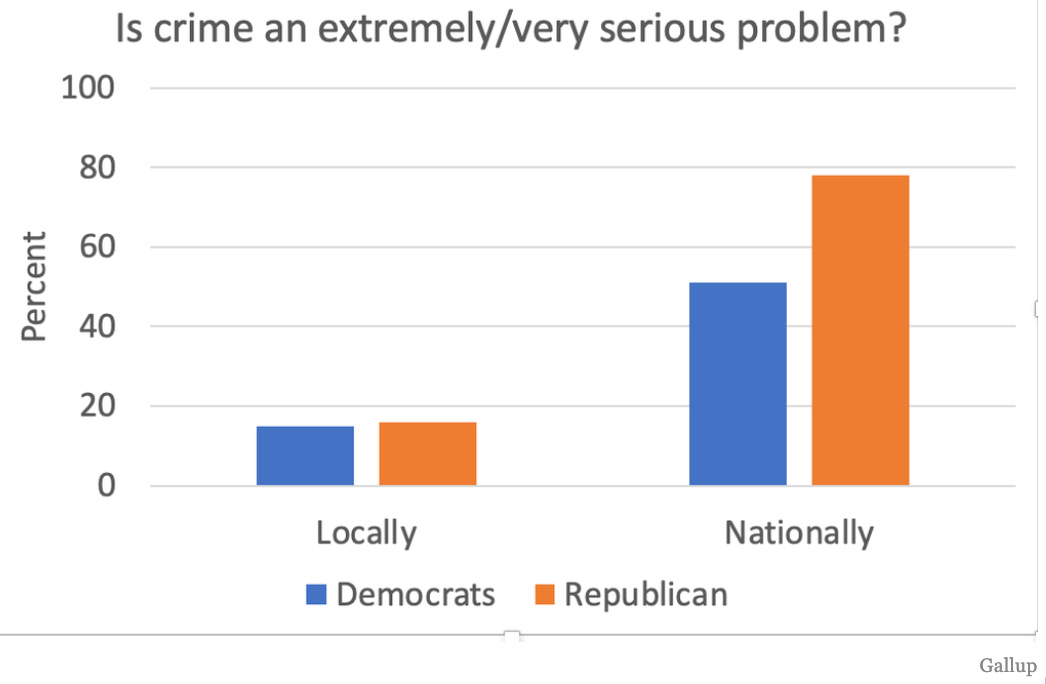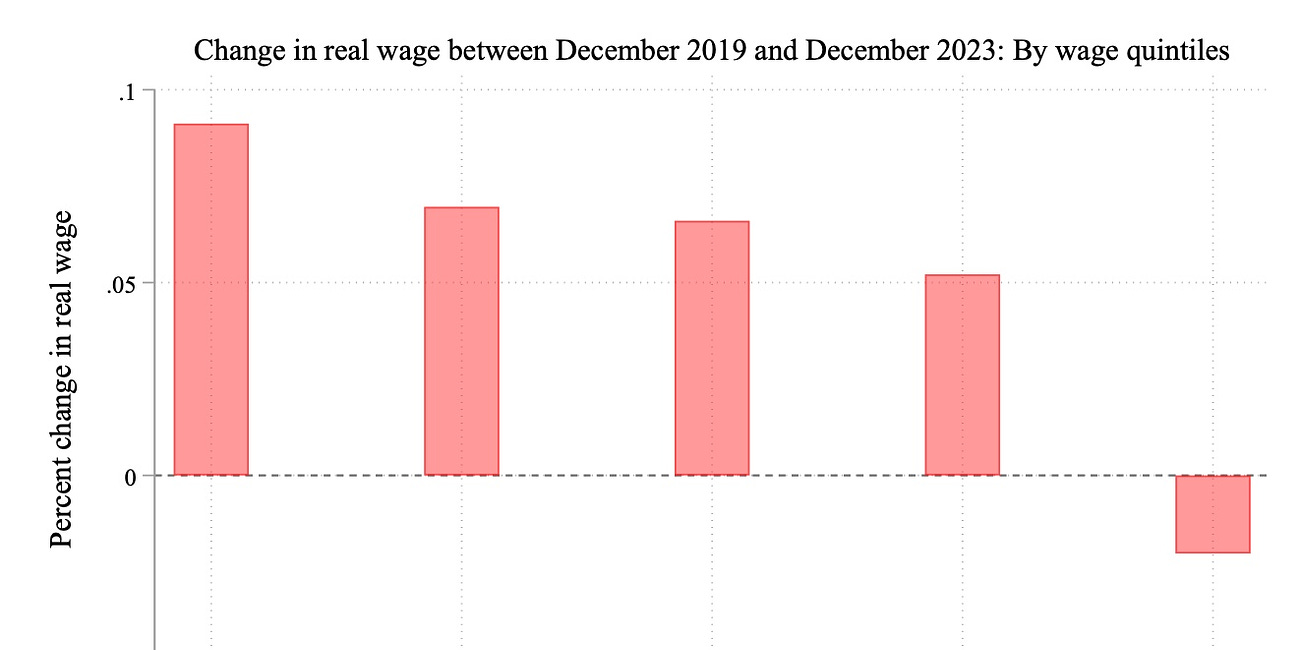BRIEFLY NOTED: For 2024-02-20 Tu
Thin gruel for those of us who really want to believe in web3; people know local crime is an annoyance but think national crime is a crisis; Fred Clark is a more eloquent critic of Alasdair MacIntyre
Thin gruel for those of us who really want to believe in web3; people know local crime is an annoyance but think national crime is a crisis; Fred Clark is a more eloquent critic of Alasdair MacIntyre than I could ever be; Dan Davies takes plutofascist grifter David Sacks to school; Chris Blattman has good insights into why we fight; in defense of Admiral John Jellicoe at Jutland; very briefly noted; & on Michael Mann’s On Wars; & BRIEFLY NOTED for 2024-02-19 Mo…
ONE VIDEO: Thin Gruel for Those of Us Who Really Want to Believe in Web3:
Tyler Cowen: “What’s the Concrete Advantage to Doing PodCasts Through Web 3.0? <https://twitter.com/liron/status/1537186589486460928>
Nada…
ONE IMAGE: Local Realities vs. Global Perceptions Once Again:
SubStack NOTES:
Moral Philosophy: Fred Clark puts my objections <braddelong.substack.com/p/hoisted-from-…> to Alasdair MacIntyre and company much more eloquently and cogently than I can:
Fred Clark: : ‘One of my favorite things about the whole Aquinastotelian school of “virtue ethics.” It’s all about practice, practice, practice. That “teleological vision of the good”? That’s supposed to come from working at it like Tony Gwynn in the batting cage, keeping at it until your callouses bleed. So it’s more than a little strange to realize that the lingering legacy of MacIntyre’s attempt to revive virtue ethics is the complaint that self-government requires us to do such work ourselves…. Richard Beck’s post seems more like his attempt to summarize those critiques than his full endorsement of them, but many of the critics he’s summarizing do not share Churchill’s preference for liberal democracy over “all other forms.” Today, these rehashed recitals of those Grunge-era critiques are coming from Orbanists and “Catholic integralists” and Bartonites and dominionists and other authoritarians who explicitly seek the end of liberal democracy…. Authoritarianism can! It can answer all of those questions so you won’t have to! It can answer all of those questions so you won’t be allowed to. And so can Orbanism, and Trumpism, and Catholic integralism, and every other form of fascism. Liberalism can’t tell you what determines a good human life, but the king or dictator or strongman can tell you that. And they will, as hard as they can…. Imagine a teleological vision of the good stomping on a human face. Forever…. To be fair, many of those pushing this Neo-Mahathirite MacIntyre-Hauerwas two-step are not calling for the end of liberal democracy and the establishment of some explicitly authoritarian religious autocracy. Most of them aren’t Adrian Vermuele <lawyersgunsmoneyblog.com/2024/02/how-mu…. But their complaint with secular government is—wittingly or un-—a call for sectarian government, which is a terrible idea with a monstrously high body count… <patheos.com/blogs/slacktivist/2024/02/1…>
CryptoGrifters: Dan Davies takes plutofascist grifter David Sacks to school:
Dan Davies: ‘Weren't you the guy crying that if Silicon Valley Bank depositors didn't get $20bn from the FDIC the tech sector would die? I'd shut up about "invented panic to justify stealing our money" for a few years if I were you: David Sacks: “Putin is the new Covid, an invented panic to justify stealing our money…” Yo this blew up, check out my forthcoming book on financialisation, decision making systems and the cybernetic history of the late 20th century…. Chwara teg to this lad, he keeps crossing my feed every six to eight months and every single time he has come up with a new reason for me to hate him. Sean Tuffy: “Also, I don’t even understand it because what money was stolen (aside from his investors who got their faces ripped off from all his shitcos and crypto pumps)… <https://twitter.com/dsquareddigest/status/1758545087640875288>
Moral Philosophy: It looks like I never wrote my review of Chris Blattman’s truly excellent Why We Fight! This is all I can find myself referring to!:
Chris Blattman & Dylan Matthews: Why Wars Start, & How To Prevent Them: 'Peace has this gravitational pull, from all the costs of war. So war only happens because some other force yanked it out of that orbit, which is actually pretty hard to do…. Maybe the warlord Charles Taylor thinks he's going to get more diamond profits by keeping the war going…. The dictatorial, personalized ruler… [has] this nationalist ideal of a unified Russia… personal glory… wanting to be the next Catherine the Great…. "Misperceptions"… war happens by mistake. Uncertainty is… when we don't know the strength of our opponent… so it seems like the optimal choice to fight. Commitment… where… we can avert our opponent from being strong in the future… [so] invade now to lock in our advantage…. Unchecked interests… the people who decide… expect to gain personally…. Intangible incentives… v.engeance or status or dominance…. Uncertainty… you don't know what cards your opponents hold…. Commitment…. If you're warned of your opponent's rise in advance… strike now…. Misperceptions…. We are overconfident…. Each one of the five interrupts the peaceful pie splitting in a different way. They relax some of the simplifying assumptions and realist principles and show which ones are most important to peace… <https://www.vox.com/future-perfect/2022/4/28/23041726/chris-blattman-why-we-fight-war-peace>
It is too bad I did not. I will try to repair this in the future…
One big caveat: Blattman views his five causes of war as rare exceptions, rather than as the warp and woof of much of human history. He is much more optimistic than I find myself capable of being. Yes, I get the economist’s instinct that every single war is first, foremost, and most powerfully a mistake: Either the aggressor should not have attacked. It should, rather, have stayed at home, cultivated its own vine and fig tree, and rested beneath them. Or, given that the aggressor was on the move, the aggressee should have struck the best bargain it could and submitted.
But we humans make an awful lot of mistakes. We—or at least the testosterone-poisoned devil-ape fragment of us—make this class of mistake much more often than we should make any class of mistake, and persist in it far beyond all reason. Blattman has very good ideas for how to make things go right and peaceful with greater frequency. But his book gives me very little insight into why, when things go wrong, they do so in the way they do in “war”, which is almost surely the stupidest of human social practices. Meanwhile, see:
Blattman, Christopher. 2022. Why We Fight: The Roots of War & the Paths to Peace. New York: Penguin Random House. <https://www.penguinrandomhouse.com/books/636263/why-we-fight-by-christopher-blattman/>.
Military Strategy: Robert Massie on Admiral John Jellicoe’s perhaps accurate fear at the Battle of Jutland that he was in fact bluffing—that the German High Seas Fleet the British Grand Fleet was confronting was the superior battlefleet:
Robert Massie: Castles of Steel: ‘Jellicoe's pessimistic arithmetic and cautious hoarding were subject to criticism during and after the war. But he refused to give way, knowing that the gray ships stretched out in lines at Scapa Flow were the primary defense of the nation. Nor was this all. Jellicoe knew or suspected something that Churchill did not know and that Jacky Fisher would never admit: vessel for vessel, German ships were better constructed (5 words) than British ships. It was Jellicoe's conviction, derived from years at the Admiralty and considerable experience with the German navy, that in matters such as armor plating, underwater protection, watertight subdivision of compartments, gunnery control, and some types of shells, the British fleet was inferior to the German. If so, the Grand Fleet was not the overwhelmingly superior weapon the country, Churchill, and many in the navy believed it to be… <books.google.com/books?pg=PT375&hl=en&n…
Churchill admittedly did recognize that Admiral Jellicoe was “the only who could lose… [WWI] in an afternoon”:
Winston Churchill: The World Crisis, vol. 3: ‘The standpoint of the Commander-in-Chief of the British Grand Fleet was unique…. It might fall to him as to no other…to issue orders which in the space of two or three hours might nakedly decide who won the war…. Jellicoe was the only man on either side who could lose the war in an afternoon. First… stood the determination not to hazard the Battle Fleet. The risk of under-water damage by torpedo and mine, and the consequent destruction of British battleship superiority, under-water lay heavy upon him. It far outweighed all considerations of the results on either side of gunfire. It was the main preoccupation of Admiralty thought before the war… <play.google.com/books/reader?pg=GBS.PR1…>
But Churchill thought that in their fears the British Admiralty were scared of their own shadows. Churchill never recognized the quite possible superiority of Germany’s High Seas Fleet as a battlefleet. But Jellicoe must have. After the explosions and sinkings of the Indefatigable, Queen Mary, and Invincible it would have been a rash Grand Fleet commanding admiral indeed who did not worry about the same vulnerabilities in at least some of his battleships proper.
Very Briefly Noted:
Economics: David Warsh: The Influencers: ‘Friedman… was nearly 40 when he turned to monetary theory. Within the profession he enjoyed growing success in the Fifties and Sixties. But vindication and celebrity waited until 1980, when he turned 69, as… Paul Volcker battled inflation under a monetarist banner; when Friedman’s… Free to Choose, with his economist wife Rose. was broadcast… and when Ronald Reagan was elected president… <https://economicprincipals.com/issues/2024.02.18/2828.html>
Irina Anghel: Brexit Backfires on UK Consultants Seeing Services Exports Slump: ‘Risks are already materializing. UK exports of services fell by £5.2 billion in the fourth quarter, with £4.3 billion of that decline coming from “other business services”—a category that includes consultants, accountants and lawyers. “It’s become harder for UK consultants to work in Europe because of Brexit”… Fiona Czerniawska said. “The damage done by Brexit won’t be undone”… <https://www.bloomberg.com/news/newsletters/2024-02-20/supply-chain-latest-slump-in-uk-services-exports>
Craig Stirling & Steve Matthews: Fed Seeks Elusive ‘Golden Path’ for Growth: ‘For the US economy to sustain strong growth without… inflation, it needs to become more productive…. Productivity growth has averaged 3.9% in that time, more than triple the rate seen in the decade prior to the pandemic…. Wall Street economists are looking for that post-Covid boom in productivity to continue. Federal Reserve officials are intrigued, but a little bit skeptical… <https://www.bloomberg.com/news/newsletters/2024-02-20/global-economy-latest-fed-seeks-elusive-golden-path-for-growth>
Anton Shilov: Nvidia becomes world's 4th most valuable company, surpasses Alphabet and Amazon: ‘Nvidia's shares… reaching a valuation of approximately $1.83 trillion…. Nvidia could end 2023 with revenue of over $58 billion… which means that the company will outperform both Intel and Samsung and will only be behind TSMC, which earned $69.3 billion in 2023…. TSMC… became the world's 10th most valuable company this week… produces chips for Nvidia… as well as Apple and AMD, which are growing fast… <https://www.tomshardware.com/tech-industry/nvidia-becomes-worlds-4th-most-valuable-company-surpasses-alphabet-and-amazon>
Robin Wigglesworth: Buy The Dip: The AI-financial complex: ‘I wrote about the monstrous derivatives market that had sprung up around Tesla and dubbed it the “Tesla-financial complex”. Today we arguably have an AI-financial complex…. Nvidia has now dethroned Tesla as the king of the single-name options market…. Merely getting somehow linked to Nvidia is now enough to lift a company’s shares…. There are genuine reasons for excitement…. But the best bubbles have had some sort of real underpinning… which markets then just take way too far. Something can be truly revolutionary and still end up costing investors an ungodly amount of money (viz canals, railways, the Nifty Fifty, the internet, China’s emergence, biotech stocks, etc etc). And this is starting to feel a bit like the moment when the AI-induced stock market boom jumped the shark…
Cybernetics: Ben Recht: arg min… <https://www.argmin.net/archive?sort=new>
Food: John Scalzi: All Hail Mayonnaise!: ‘The time was 1756. The place: Mahon…. The occasion: The capture of the city by the forces of Louis-Francois-Armad de Vignerot du Plessis, duc de Richelieu…. Louis decided it was time to celebrate and ordered his chef to whip up a feast. The chef… discovered, to his horror, that there was no cream to be found. Sacre bleu! Showing the improvisatory spirit that can only be brought on by sheer panic, the chef grabbed some eggs and some vegetable oil, put them together, grabbed a wisk, and begun to pray. The result: Mayonnaise, named for the captured city.You decide whether God truly answered that prayer… <https://whatever.scalzi.com/2013/10/09/all-hail-mayonnaise/>
Journamalism: Matthew Winkler (2023): Biden’s Bad Economic Polls Come With An Asterisk: ‘Despite their feelings about the economy, an overwhelming majority of Americans say their personal financial situation is either good or excellent. What gives?… <https://www.bloomberg.com/opinion/articles/2023-11-22/joe-biden-s-bad-economic-polls-should-come-with-big-asterisk>
Human Capital: David Deming: Should Selective College Admissions be Test-Optional?: ‘A hundred years ago, the SAT expanded access to the Ivy League. Can history repeat itself?…. SAT/ACT scores tell you a lot about who is prepared for college-level work. Importantly, this holds for disadvantaged students as well. The authors split the prediction into applicants coming from more vs. less-advantaged high schools and found that SAT is roughly equally predictive within each group… <
Noah Smith: Why Philosophers Read the Classics: ‘Newton’s laws of motion can be fully and easily understood without reading Newton…. We expect philosophers to help us think about complex problems that usually have no definitive, verifiably “correct” answer. The former requires simplicity, the latter requires nuance and depth…. There’s more than one meaning of the word “progress”. In physics, with its focus on simplicity and applicability, progress means subsuming or replacing old theories and improving on old technologies. In philosophy, progress often means adding a perspective on an old question, without necessarily discarding the old perspectives… <












Even at the time of Jutland, submarines had rendered surface fleets largely obsolete. The German strategy was to lure the British Fleet into range of their submarines.
By the time of WWII the usefulness of surface fleets was limited to areas beyond the reach of land-based aircraft, so the important action was between aircraft carriers. But as the range of aircraft and missiles has increased, the area in which surface ships can operate safely has sunk to zero, as the Black Sea Fleet has discovered.
That hasn't stopped the expenditure of vast amounts on navies that do nothing
Stirling and Mathews:
It's really more the job of President and Congress to promote productivity. The most the Fed can do is avoid recession. The Fed cannot reduce the deficit, invest wisely, reform immigration or tax net emissions of CO2.